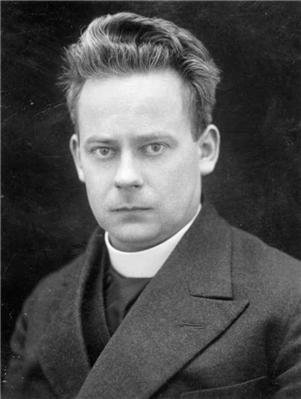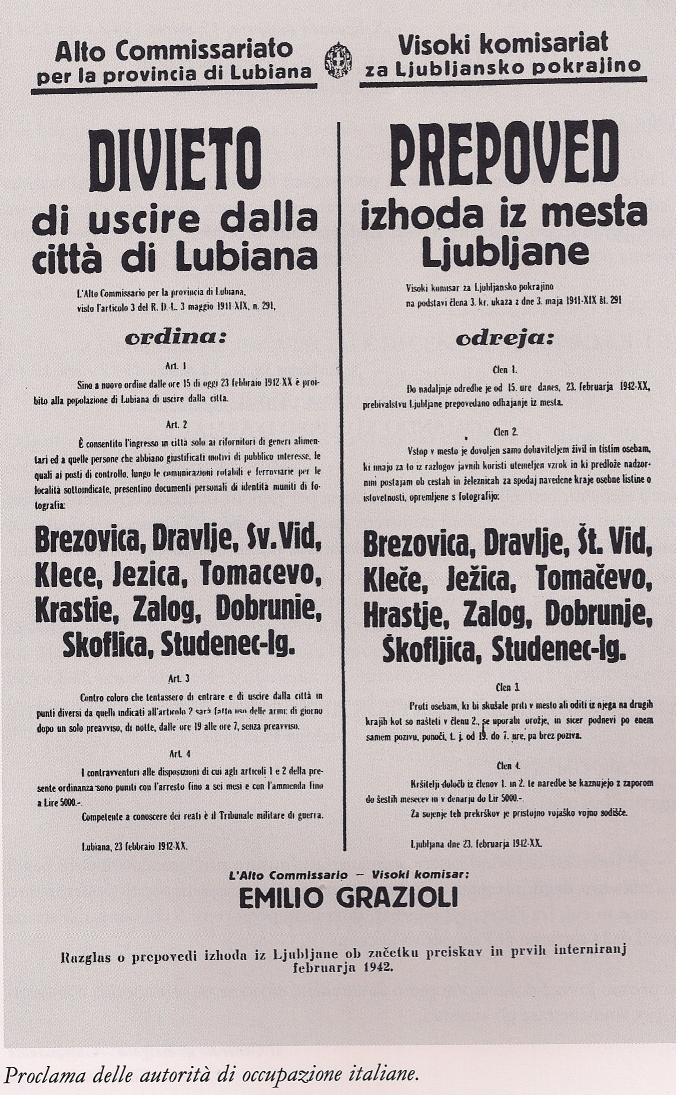|
Ivan Ahčin
Ivan Ahčin (March 9, 1897, Domžale – February 16, 1960) was a Slovene sociologist, journalist, author and politician. He studied theology at the University of Ljubljana, where he graduated in 1925. He later worked as a professor of sociology at the University of Ljubljana. Between 1929 and 1941 he was also the editor of the daily newspaper '' Slovenec'', the official organ of the Slovene People's Party and one of the two most influential newspapers in Slovenia. He was one of the closest collaborators of the conservative Slovene politician Anton Korošec. After the Axis invasion of Yugoslavia in April 1941, Ahčin co-operated with Marko Natlačen, former governor of the Drava Banovina in the Kingdom of Yugoslavia, who advocated the collaboration with the Italian occupation authorities of the Province of Ljubljana. After the assassination of Natlačen by Slovene Communist agents in October 1942, Ahčin emigrated to Rome, from where he contacted the Yugoslav government in exil ... [...More Info...] [...Related Items...] OR: [Wikipedia] [Google] [Baidu] |
Province Of Ljubljana
The Province of Ljubljana ( it, Provincia di Lubiana, sl, Ljubljanska pokrajina, german: Provinz Laibach) was the central-southern area of Slovenia. In 1941, it was annexed by Fascist Italy, and after 1943 occupied by Nazi Germany. Created on May 3, 1941, it was abolished on May 9, 1945, when the Slovene Partisans and partisans from other parts of Yugoslavia liberated it from the Nazi Operational Zone of the Adriatic Littoral. Its administrative centre was Ljubljana. Background During World War II, Drava Banovina was in a unique situation. While Greece shared its experience of being trisected, this territory (roughly present-day Slovenia) experienced a further step—absorption and annexation into neighboring Nazi Germany, Fascist Italy, and Hungary.Gregor Joseph Kranjc (2013To Walk with the Devil University of Toronto Press, Scholarly Publishing Division, p. introduction 5 After Yugoslavia was invaded by Axis Powers on 6 April 1941, Germany and Hungary occupied and annexed the ... [...More Info...] [...Related Items...] OR: [Wikipedia] [Google] [Baidu] |
Ervin Dolenc
*
*
{{Disambiguation ...
Ervin may refer to: *Ervin (given name) *Ervin (surname) *Ervin Township, Howard County, Indiana, one of eleven townships in Howard County, Indiana, USA See also * Justice Ervin (other) * Earvin * Ervine * Erving (other) * Erwan * Erwin (other) * Irvin * Irvine * Irving (other) * Irwin (other) Irwin may refer to: Places ;United States * Irwin, California * Irwin, Idaho * Irwin, Illinois * Irwin, Iowa * Irwin, Nebraska * Irwin, Ohio * Irwin, Pennsylvania * Irwin, South Carolina * Irwin County, Georgia * Irwin Township, Venango County ... [...More Info...] [...Related Items...] OR: [Wikipedia] [Google] [Baidu] |
Bojan Godeša
Bojan (Serbian Cyrillic and Macedonian Cyrillic alphabet, Macedonian: Бојан; Ukrainian Cyrillic alphabet, Ukrainian, Russian Cyrillic alphabet, Russian and Bulgarian Cyrillic: Боян, transcribed ''Boyan'') is a Slavic given name, derived from the Slavic noun ''boj'' "battle." The ending ''-an'' is a suffix frequently found in anthroponyms of Slavic origin. The feminine variant is Bojana (given name), Bojana. The name is recorded in historical sources among Serbs, Bulgarians, Czechs, Polish people, Poles, Croats, Slovenians, Macedonians (ethnic group), Macedonians, Ukrainians and Russians. In Slovenia, it is the 18th most popular name for males, as of 2010. (in Slovenian). Statistical Office of the Republic of Slovenia. [...More Info...] [...Related Items...] OR: [Wikipedia] [Google] [Baidu] |
Ljubljana
Ljubljana (also known by other historical names) is the capital and largest city of Slovenia. It is the country's cultural, educational, economic, political and administrative center. During antiquity, a Roman city called Emona stood in the area. Ljubljana itself was first mentioned in the first half of the 12th century. Situated at the middle of a trade route between the northern Adriatic Sea and the Danube The Danube ( ; ) is a river that was once a long-standing frontier of the Roman Empire and today connects 10 European countries, running through their territories or being a border. Originating in Germany, the Danube flows southeast for , ... region, it was the historical capital of Carniola, one of the Slovenes, Slovene-inhabited parts of the Habsburg monarchy. It was under House of Habsburg, Habsburg rule from the Middle Ages until the dissolution of the Austria-Hungary, Austro-Hungarian Empire in 1918. After World War II, Ljubljana became the capital of the So ... [...More Info...] [...Related Items...] OR: [Wikipedia] [Google] [Baidu] |
Buenos Aires
Buenos Aires ( or ; ), officially the Autonomous City of Buenos Aires ( es, link=no, Ciudad Autónoma de Buenos Aires), is the Capital city, capital and primate city of Argentina. The city is located on the western shore of the Río de la Plata, on South America, South America's southeastern coast. "Buenos Aires" can be translated as "fair winds" or "good airs", but the former was the meaning intended by the founders in the 16th century, by the use of the original name "Real de Nuestra Señora Santa María del Buen Ayre", named after the Madonna of Bonaria in Sardinia, Italy. Buenos Aires is classified as an Global city, alpha global city, according to the Globalization and World Cities Research Network (GaWC) 2020 ranking. The city of Buenos Aires is neither part of Buenos Aires Province nor the Province's capital; rather, it is an autonomous city, autonomous district. In 1880, after Argentine Civil War, decades of political infighting, Buenos Aires was federalization of Bueno ... [...More Info...] [...Related Items...] OR: [Wikipedia] [Google] [Baidu] |
University Of Buenos Aires
The University of Buenos Aires ( es, Universidad de Buenos Aires, UBA) is a public research university in Buenos Aires, Argentina. Established in 1821, it is the premier institution of higher learning in the country and one of the most prestigious universities of Ibero-America. It has educated 17 Argentine presidents, produced four of the country's five Nobel Prize laureates, and is responsible for approximately 40% of the country's research output. The ''QS World University Rankings'' currently places the UBA at number 67, the highest ranking university in the Spanish-speaking world. The university's academic strength and regional leadership make it attractive to many international students, especially at the postgraduate level. Just over 4 percent of undergraduates are foreigners, while 15 percent of postgraduate students come from abroad. The Faculty of Economic Sciences has the highest rate of international postgraduate students at 30 percent, in line with its reputation a ... [...More Info...] [...Related Items...] OR: [Wikipedia] [Google] [Baidu] |
Argentina
Argentina (), officially the Argentine Republic ( es, link=no, República Argentina), is a country in the southern half of South America. Argentina covers an area of , making it the second-largest country in South America after Brazil, the fourth-largest country in the Americas, and the eighth-largest country in the world. It shares the bulk of the Southern Cone with Chile to the west, and is also bordered by Bolivia and Paraguay to the north, Brazil to the northeast, Uruguay and the South Atlantic Ocean to the east, and the Drake Passage to the south. Argentina is a federal state subdivided into twenty-three provinces, and one autonomous city, which is the federal capital and largest city of the nation, Buenos Aires. The provinces and the capital have their own constitutions, but exist under a federal system. Argentina claims sovereignty over the Falkland Islands, South Georgia and the South Sandwich Islands, and a part of Antarctica. The earliest recorded ... [...More Info...] [...Related Items...] OR: [Wikipedia] [Google] [Baidu] |
Gorizia
Gorizia (; sl, Gorica , colloquially 'old Gorizia' to distinguish it from Nova Gorica; fur, label=Standard Friulian, Gurize, fur, label= Southeastern Friulian, Guriza; vec, label= Bisiacco, Gorisia; german: Görz ; obsolete English ''Goritz'') is a town and ''comune'' in northeastern Italy, in the autonomous region of Friuli Venezia Giulia. It is located at the foot of the Julian Alps, bordering Slovenia. It was the capital of the former Province of Gorizia and is a local center of tourism, industry, and commerce. Since 1947, a twin town of Nova Gorica has developed on the other side of the modern-day Italy–Slovenia border. The region was subject to territorial dispute between Italy and Yugoslavia after World War II: after the new boundaries were established in 1947 and the old town was left to Italy, Nova Gorica was built on the Yugoslav side. The two towns constitute a conurbation, which also includes the Slovenian municipality of Šempeter-Vrtojba. Since May 2011, t ... [...More Info...] [...Related Items...] OR: [Wikipedia] [Google] [Baidu] |
Janko Kralj
Janko is a name that derives from a diminutive form of the name ''Jan'' (Slavic languages), '' Janez'' (Slovenian), '' János'' (Hungarian), and ''Yakov''/''Jacob'' (Ashkenazi Jewish). It also derives from the vernacular form of Latin ''Johannes''. Notable people with the name include: Given name *Janko Benša (born 1977), Serbian distance runner *Janko Bobetko (1919–2003), Croatian general *Janko Brašić (1906–1994), Serbian naïve painter *Janko Drašković (1770–1856), Croatian politician *Janko Dreyer (born 1994), South African cricketer *Janko Gagić (died 1804), Serbian hajduk leader *Janko Gojković (born 1973), Bosnian swimmer *Janko Gredelj (1916–1941), Yugoslav communist *Janko Halkozović (fl. 1757), Serbian painter *Janko Janša (born 1900), Slovenian cross-country skier *Janko Jesenský (1874–1945), Slovak lower nobleman and member of the Slovak national movement *Janko Kamauf (1801–1874), city magistrate of Gradec and mayor of Zagreb, Croatia *Janko Ker ... [...More Info...] [...Related Items...] OR: [Wikipedia] [Google] [Baidu] |
Miha Krek
Miha Krek (28 September 1897 – 18 November 1969) was a Slovenian lawyer and conservative politician. Between 1941 and 1969, he was the informal leader of the Slovenian anti-Communist Anti-communism is political and ideological opposition to communism. Organized anti-communism developed after the 1917 October Revolution in the Russian Empire, and it reached global dimensions during the Cold War, when the United States and th ... emigration. Born in the Upper Carniolan village of Leskovica, Gorenja vas - Poljane, Leskovica, he studied at the St. Stanislaus Institute (Slovenia), St. Stanislaus Institute in Šentvid, Ljubljana, Šentvid near Ljubljana. During World War I, he was drafted in the Austro-Hungarian Army. After the war, he studied law at the universities of University of Zagreb, Zagreb and University of Ljubljana, Ljubljana, where he obtained his PhD in 1930. Until 1935, he had a law firm in Ljubljana. Krek joined the conservative Catholic Slovene People's Party ( ... [...More Info...] [...Related Items...] OR: [Wikipedia] [Google] [Baidu] |
London
London is the capital and List of urban areas in the United Kingdom, largest city of England and the United Kingdom, with a population of just under 9 million. It stands on the River Thames in south-east England at the head of a estuary down to the North Sea, and has been a major settlement for two millennia. The City of London, its ancient core and financial centre, was founded by the Roman Empire, Romans as ''Londinium'' and retains its medieval boundaries.See also: Independent city#National capitals, Independent city § National capitals The City of Westminster, to the west of the City of London, has for centuries hosted the national Government of the United Kingdom, government and Parliament of the United Kingdom, parliament. Since the 19th century, the name "London" has also referred to the metropolis around this core, historically split between the Counties of England, counties of Middlesex, Essex, Surrey, Kent, and Hertfordshire, which largely comprises Greater London ... [...More Info...] [...Related Items...] OR: [Wikipedia] [Google] [Baidu] |




